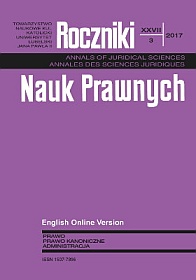Psychological Disorders in the Perpetrator of a Prohibited Acta as the Object of Judicial Consideration in the Procedure for Petty Offences After 1 July 2015
Abstract
The subjective capacity of an offender to be assigned guilt is determined by such circumstances as the attainment of the age required by the law and a suitable mental state. Psychological disorders, which are the source of insanity or diminished sanity as regulated by the Petty Offences Code, lead to a considerable reduction of the capacity to recognise the significance of an act or direct one’s conduct, and this in turn leads to the exclusion of guilt or restricts responsibility under the Petty Offences Code. The existence of doubt regarding the mental state of an offender implies the appointment of expert psychiatrists by a competent judicial body in order to conduct a psychiatric examination. The doubt must be reasonable and objective, though, supported by evidence or observations of the judicial body. The opinion of an expert psychiatrist is pivotal to the proceedings as it explains the offender’s conduct during and after the perpetration of a prohibited act, which permits an assessment whether the offender’s mental condition allow him to take part in the proceedings, including self-defence. The judicial and psychiatric diagnosis also has adverse consequences for the examined person so it must not be regarded as a mere formality in every petty offence case. The act of September 27, 2013 amended the provisions for procedure for petty offences in terms of, among others, regarding provisions concerning the content of psychiatric assessment furnished by experts and the formal mandatory defence. The article aims to determine the scope of this revision and its impact on the exercise of procedural guarantees of the offender.
References
Bojarski, Tadeusz. Polskie prawo wykroczeń. Zarys wykładu. Warsaw: LexisNexis, 2005.
Bojarski, Tadeusz. “Komentarz do art. 17.” In Kodeks wykroczeń. Komentarz, edited by T. Bojarski, A. Michalska-Warias, J. Piórkowska-Fliger et al., 84–86. Warsaw: Wolters Kluwer, 2015.
Cieślak, Marian. “Rozdział VIII.” In Psychiatria w procesie karnym, by Marian Cieślak, Karol Spett, Władysław Wolter, and Adam Szymusik, 465–490. Warsaw: Wydawnictwo Prawnicze, 1991.
Dąbkiewicz, Krzysztof. Kodeks postępowania karnego. Komentarz do zmian 2015. Warsaw: Wolters Kluwer, 2015.
Grzegorczyk, Tomasz. Kodeks postępowania w sprawach o wykroczenia. Komentarz. Warszawa: Wolters Kluwer, 2012.
Grzegorczyk, Tomasz. “Rozdziały I–VII (art. 1-48).” In Kodeks wykroczeń. Komentarz, edited by T. Grzegorczyk, W. Jankowski, and M. Zbrojewska, 17–183. Warsaw: Wolters Kluwer, 2010.
Hajdukiewicz, Danuta. “Biegli psychiatrzy w postępowaniu karnym.” Niebieska Linia 3 (2001): 10–12.
Hajdukiewicz, Danuta. Podstawy prawne opiniowania sądowo-psychiatrycznego w postępowaniu karnym, w sprawach o wykroczenia oraz w sprawach nieletnich. Warsaw: Instytut Psychiatrii i Neurologii, 2007.
Hajdukiewicz, Danuta. Unormowania prawne opiniowania sądowo-psychiatrycznego w sprawach karnych i w sprawach nieletnich. Podstawowe wiadomości dla specjalizujących się w psychiatrii. Warsaw: Instytut Psychiatrii i Neurologii, 2002.
Ładoś, Sebastian. Pozycja prawna oskarżonego z zaburzeniami psychicznymi. Warsaw: Wolters Kluwer, 2013.
Majewski, Jarosław. Kodeks karny. Komentarz do zmian 2015. Warsaw: Wolters Kluwer, 2015.
Skowron, Andrzej. Glosa do wyroku SN z dnia 30 marca 2015 r., II KK 77/15, LEX/el. 2015.
Skowron, Andrzej. Kodeks postępowania w sprawach o wykroczenia. Komentarz. Gdańsk: Wydawnictwo Arche, 2006.
Skwarczyński, Hubert. “Inspektor pracy w nowym postępowaniu w sprawach o wykroczenia.” Praca i Zabezpieczenie Społeczne 9 (2003): 28–35.
Świecki, Dariusz. “Wina w prawie karnym materialnym i procesowym.” Prokuratura i Prawo 11–12 (2009): 5–14.
Zachuta, Andrzej. “Postępowanie w sprawach o wykroczenia (czynności wyjaśniające).” Monitor Prawniczy 5 (2002): 212–18.
Copyright (c) 2017 Roczniki Nauk Prawnych

This work is licensed under a Creative Commons Attribution-NonCommercial-NoDerivatives 4.0 International License.


